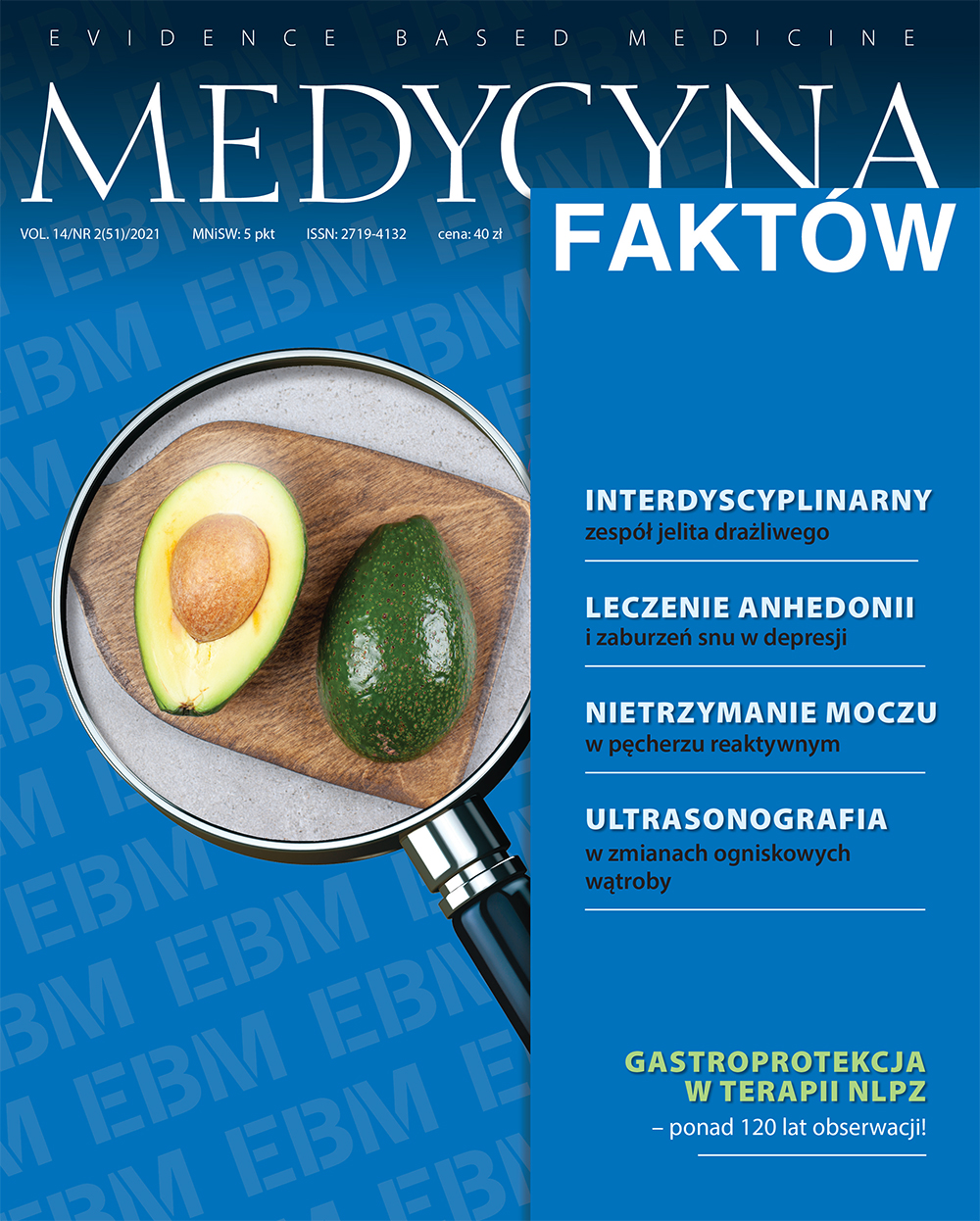Gastroprotekcja w trakcie przewlekłej terapii NLPZ – co wiemy po ponad 120 latach obserwacji? Artykuł przeglądowy
##plugins.themes.bootstrap3.article.main##
Abstrakt
Niesteroidowe leki przeciwzapalne (NLPZ) stanowią grupę preparatów często stosowanych przez lekarzy praktykujących w zakresie różnych specjalizacji. Szerokie spektrum działań niepożądanych przewlekłej terapii NLPZ obejmuje głównie, choć nie tylko, działania niepożądane ze strony przewodu pokarmowego. Ustalenie ryzyka powikłań gastrologicznych u takich chorych jest ważnym elementem planowania takiej terapii, która pozwala lekarzowi określić konieczność stosowania przez pacjenta inhibitorów pompy protonowej w ramach gastroprotekcji. W artykule podano kryteria takiej oceny oraz sposób prowadzenia odpowiedniej profilaktyki wystąpienia działań niepożądanych ze strony przewodu pokarmowego u pacjentów w trakcie przewlekłej terapii NLPZ.
##plugins.themes.bootstrap3.article.details##
Copyright © by Medical Education. All rights reserved.
Bibliografia
2. Samborski W, Filipiak KJ, Kaczmarczyk J et al. Niesteroidowe leki przeciwzapalne a powikłania sercowo-naczyniowe i gastroenterologiczne – algorytm wyboru. Choroby Serca i Naczyń. 2016; 13(4): 257-64.
3. Kossakowski B. Dużo reklam to mało szczęścia. O konsumpcyjnych obłędach i obsesjach na UG (access: 22.02.2021).
4. Sostres C, Carrera-Lasfuentes P, Lanas A. Non-steroidal anti-inflammatory drug related upper gastrointestinal bleeding: types of drug use and patient profiles in real clinical practice. Curr Med Res Opin. 2017; 33(10): 1815-20.
5. Goździalska A, Jerzy Jaśkiewicz J. Mechanizm działania niesteroidowych leków przeciwzapalnych. Państwo i Społeczeństwo. 2014; XIV(1).
6.NSAID Gastropathy (access: 13.03.2021).
7. Ahsberg K, Höglund P, Staël von Holstein C. Mortality from peptic ulcer bleeding: the impact of comorbidity and the use of drugs that promote bleeding. Aliment Pharmacol Ther. 2010; 32: 801-10.
8. Mercadante S, Genovese G, Kargar JA et al. Home palliative care: results in 1991 versus 1988. J Pain Symptom Manage. 1992; 7: 414-8.
9. Kanno T, Moayyedi P. Who needs gastroprotection in 2020? Curr Treat Options Gastroenterol. 2020; 1-17.
10. Vaduganathan M, Bhatt DL. Gastrointestinal bleeding with oral anticoagulation: understanding the scope of the problem. Clin Gastroenterol Hepatol. 2017; 15: 691-3.
11. Mercadante S. The use of anti-inflammatory drugs in cancer pain. Cancer Treat Rev. 2001; 27: 51-61.
12. Woroń J, Wordliczek J, Dobrogowski J. Porównanie niesteroidowych leków przeciwzapalnych (NLPZ). Medycyna po Dyplomie. 2011; 20(6[183]): 55-63.
13. Malfertheiner P, Megraud F, O’Morain CA et al. European Helicobacter and Microbiota Study Group and Consensus panel. Management of Helicobacter pylori infection – the Maastricht V/Florence Consensus Report. Gut. 2017; 66: 6-30.
14. Andersen IB, Jorgensen T, Bonnevie O et al. Smoking and alcohol intake as risk factors for bleeding and perforated peptic ulcers: a population- based cohort study. Epidemiology. 2000; 11(4): 434-9.
15. Rostom A, Moayyedi P, Hunt R; Canadian Association of Gastroenterology Consensus Group. Canadian consensus guidelines on long-term nonsteroidal anti-inflammatory drug therapy and the need for gastroprotection: benefits versus risks. Aliment Pharmacol Ther. 2009; 29: 481-96.
16. Mo C, Sun G, Wang YZ et al. PPI versus histamine H2 receptor antagonists for prevention of upper gastrointestinal injury associated with low-dose aspirin: systematic review and meta-analysis. PLoS One. 2013; 10: e0131558.
17. Yeomans ND, Tulassay Z, Juhasz L et al. A comparison of omeprazole with ranitidine for ulcers associated with nonsteroidal antiinflammatory drugs. Acid Suppression Trial: Ranitidine versus Omeprazole for NSAID-associated Ulcer Treatment (ASTRONAUT) Study Group. N Engl J Med. 1998; 338: 719-26.
18. Rostom A, Dube C, Wells G et al. Prevention of NSAID-induced gastroduodenal ulcers. Cochrane Database Syst Rev. 2002; (4): CD002296.
19. Konturek SJ, Konturek PC, Brzozowski T. Prostaglandins and ulcer healing. J Physiol Pharmacol. 2005; 56(suppl 5): 5-31.
20. Gostishchev VK, Evseev MA. Patogenez retsidiva ostrykh gastroduodenal’nykh iazvennykh krovotecheniĭ [Pathogenesis of recurrences of acute gastroduodenal ulcerous bleedings]. Khirurgiia (Mosk). 2004; (5): 46-51.
21. Freigofas J, Haefeli WE, Schöttker B et al. Indirect evidence for proton pump inhibitor failure in patients taking them independent of meals. Pharmacoepidemiol Drug Saf. 2014; 23(7): 768-72.
22. Gunaratnam NT, Jessup TP, Inadomi J et al. Sub-optimal proton pump inhibitor dosing is prevalent in patients with poorly controlled gastro-oesophageal reflux disease. Aliment Pharmacol Ther. 2006; 23: 1473-7.
23. Wolfe MM, Sachs G. Acid suppression: optimizing therapy for gastroduodenal ulcer healing, gastroesophageal reflux disease, and stress-related erosive syndrome. Gastroenterology. 2000; 118: S9-S31.
24. Park SC, Chun HJ, Kang CD et al. Prevention and management of non-steroidal anti-inflammatory drugs-induced small intestinal injury. World J Gastroenterol. 2011; 17(42): 4647-53.
25. Yuan JQ, Tsoi KKF, Yang M et al. Systematic review with network meta-analysis: comparative effectiveness and safety of strategies for preventing NSAID-associated gastrointestinal toxicity. Aliment Pharmacol Ther. 2016; 43(12): 1262-75.
26. Pilotto A, Franceschi M, Leandro G et al. Proton-pump inhibitors reduce the risk of uncomplicated peptic ulcer in elderly either acute or chronic users of aspirin/non-steroidal anti-inflammatory drugs. Aliment Pharmacol Ther. 2004; 20: 1091-7.
